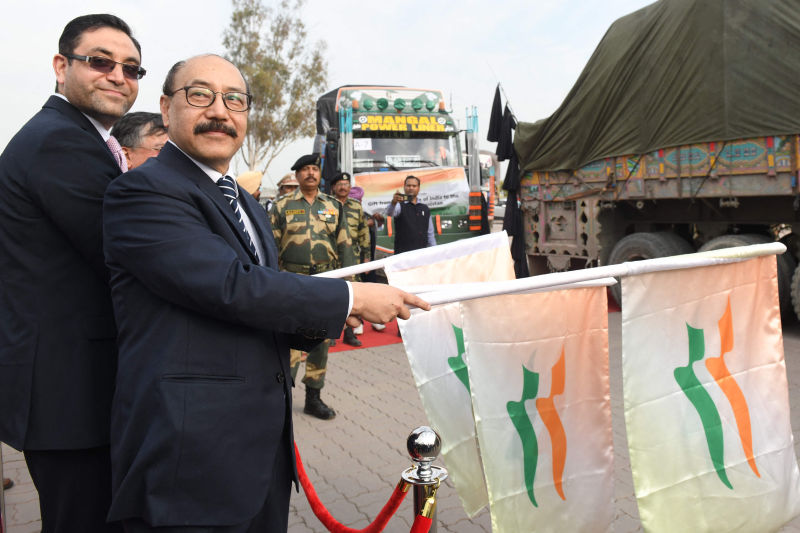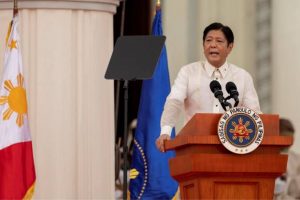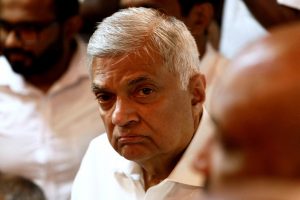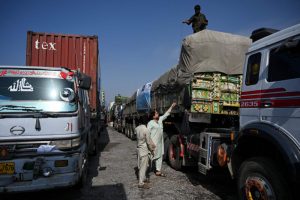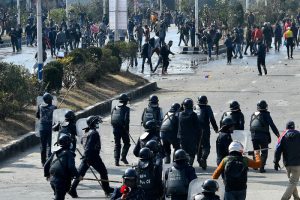Pakistan will allow India to send food aid to Afghanistan through its territory via a little-used route as the Taliban-ruled country faces increasing poverty and hunger.
The first convoy of 50 trucks carrying 2,500 tonnes of wheat left the north Indian city of Amritsar after a ceremony attended by India’s foreign secretary Harsh Vardhan Shringla.
“India remains committed to its special relationship with the people of Afghanistan,” a foreign ministry statement said. In total, India plans to send 50,000 tonnes of wheat to Afghanistan on an infrequently used land route through Pakistan.
Permission for such a convoy is rare, with Pakistan having barred the entry of goods from India for years as the relationship between the two nuclear-armed nations has deteriorated.
The Taliban-led administration has been using wheat as payment for thousands of government workers, mostly labourers, as the country’s financial crisis intensifies.
The impoverished, war-ravaged country has been short of cash since the US government froze Afghanistan’s dollar-denominated assets.
Earlier this month, Washington said it would use half the $7 billion in frozen assets on US soil for humanitarian aid.
The rest would potentially settle lawsuits over the September 11, 2001 terrorist attacks on the World Trade Center in New York and the Pentagon in Washington.
Da Afghanistan Bank (DAB) criticised the decision, saying its assets had been invested in the US in line with international practices, and belonged to the people of Afghanistan.
“DAB considers the latest decision on blocking [the] reserves and allocating them to irrelevant purposes [an] injustice to the people of Afghanistan,” the central bank said in a statement.
World Bank Plan
Meanwhile, the World Bank’s management has approved a plan to use some $1 billion in a frozen Afghanistan trust fund for education, agriculture, health and family programs, according to a bank paper and two sources, in what would be a major boost to efforts to ease the country’s worsening humanitarian and economic crises.
The plan aims to bypass sanctioned Taliban authorities by disbursing the money in the World Bank-administered Afghanistan Reconstruction Trust Fund (ARTF) through UN agencies.
It is set to be discussed by the World Bank board on March 1, the sources familiar with the plan said, who spoke on condition of anonymity. Donors to the fund would then need to give approval for the release of any money.
The move would follow a successful disbursement of $280 million from the same trust fund to the World Food Program (WFP) and UN children’s agency UNICEF to support nutrition and health in Afghanistan over the past few months.
The plan is to “make available just over US$1 billion in ARTF resources in calendar year 2022.” Recognizing that the situation remains fluid, it aims for flexibility by making four disbursals of a total $600 million and the remainder “on a priority basis” for the rest of the year.
The aim “is to protect the vulnerable, help preserve human capital and key economic and social institutions and reduce the need for future humanitarian assistance,” according to the World Bank paper. It called for the fund to be used for food security, health and education programs.
UN Secretary-General Antonio Guterres called last month for the release of the remaining $1.2 billion in the fund to help Afghanistan’s people survive the winter, stressing: “Time is of the essence.”
‘Access and Equity’
The United Nations is warning that nearly 23 million people – about 55% of the impoverished country’s population – are facing extreme levels of hunger, with nearly 9 million at risk of starvation.
Billions of dollars in Afghan central bank reserves, the World Bank-administered trust fund and foreign financial aid were frozen to keep it out of Taliban hands. The Islamist group seized power in August as foreign troops left after Afghanistan’s most recent war, which lasted 20 years.
Graeme Smith, senior consultant for the International Crisis Group think tank, said the World Bank plan would provide urgently needed money while circumventing the Taliban, whose leaders are under US and UN sanctions.
“This helps to unstick a big chunk of money. It will get us rolling forward,” he said, adding that further efforts were needed to unfreeze the central bank assets.
The World Bank’s plan sets “minimum conditions for access and equity” aimed at ensuring girls are allowed in schools, female teachers can work, women are included in community councils, women-headed households receive food aid and female health workers are allowed to work.
It calls for some $150 million to be distributed through UNICEF for stipends to over 200,000 teachers who have not been paid for more than six months. Another $100 million would be earmarked to improve community resilience, $150 million to $200 million for food security, and $150 million for health programs.
- Reuters, with additional editing by George Russell
This report was updated on February 23, 2022 with further details.
READ MORE:
Afghan Diplomats Stranded, Penniless – The Times
Taliban Approve First Budget Since Afghan Takeover
China Warns Miners Against ‘Blindly’ Visiting Afghanistan




